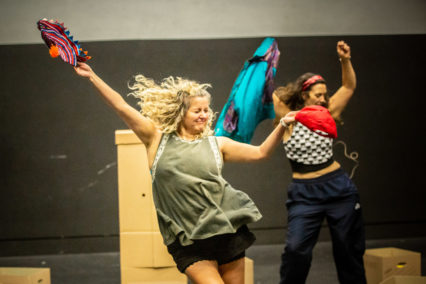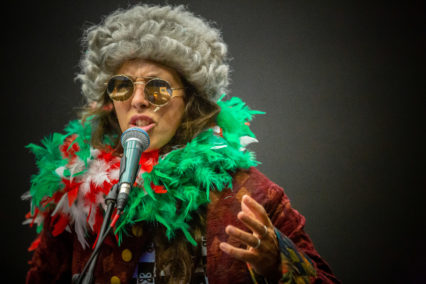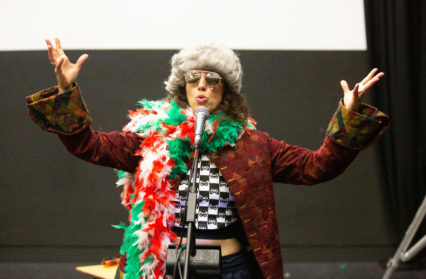While the rest of us have been adjusting to a return to life post-lockdown, Lisa Jên Brown – frontwoman of Welsh folk band 9Bach – has been busy adapting her audio play Double Drop for the stage in Edinburgh. The two-hander from Dirty Protest Theatre features Lisa alongside Mirain Haf Roberts in a story of colliding cultures in which the Eisteddfod clashes with the ’90s free party rave scene. Caragh Medlicott caught up with Lisa to hear more about the experience of writing, starring and providing the score for her own theatrical production.
Caragh Medlicott: You have a serious hand in Double Drop, both writing and performing in it, and also contributing via the original music from your band 9Bach. What has that experience been like? Have you found it cohesive, or do those different creative processes feel quite separate to you?
Lisa Jên Brown: It’s been quite mental, but also lovely to be so heavily involved in the whole process. I have managed to detach myself from the scriptwriting, as an actor, so that’s good. I even found myself saying ‘God! These words are hard to learn, who the hell wrote it?’ When I create something from the heart, it’s really lovely to be able to be part of the whole process right until the run of the shows. It’s definitely been a challenge, but I’ve loved it. Why not write your own show, compose music for it — and heck — be in it as well. It has so many autobiographical moments in it, the soul of it comes from deep within me, so I guess it all makes sense, really.
Caragh Medlicott: The Edinburgh Fringe is such an important event on the arts and cultural calendar, yet Dirty Protest Theatre is one of the only Welsh theatre companies with a live presence this year. What have the challenges been like gearing up for a live performance and how did you find the process of re-imagining what was, originally, an audio play from the first lockdown of 2020?
Lisa Jên Brown: Dirty Protest are amazing for just… doing it. They have balls. They have a good reputation as a theatre company and so people trust that they can put on a good show, and the buzz that’s around Double Drop in Edinburgh is really tangible. So this particular show — which was, as you say, originally a short audio play — has a message I think we all want to hear, and so when we were gearing up for a live performance, that message carried us through the process. Sitting in a rehearsal room imagining an audience that wants to dance and feel alive, to numb themselves from chaos, to feel connected and simply to share the love, that felt very exciting. We were desperate to share that, and so we could almost imagine it and preempt this collective feeling after eighteen months of carnage. And what’s great is it was exactly how we thought it would be. People dancing, crying and feeling as one. It’s been beautiful!
I guess my writing is very sensory, it’s pretty graphic in that I see images all the time. I talk in metaphors and I overshare, and so that comes out as I write. To adapt an audio play where you can be like that, into a stage play where you have to be less of that, was a learning curve. But Catherin and Tim at DP have been incredible! I’ve learned so much and the support and care is immense.
Caragh Medlicott: Double Drop is drawn partially from your own experiences growing up in North Wales, capturing a tension between traditional Welsh culture and the ’90s free party rave scene — what attracted you to this story at this point in time?
Lisa Jên Brown: I just want to dance! I wanted to feel alive again, I wanted to feel part of something. I wanted to remember. I am now in my forties and I bloody miss the raves. I miss feeling like one big family. I think I can say that dancing in the slate and braken was one of the best moments of my life, and I wanted to revisit that. What I find with a live audience now is how collective that feeling is. The smiles and the knowing nods are tremendous.
Also, in the 90s — coinciding with the acid house movement — was the Eisteddfod. And what a clash of cultures that was. I was, and still am, a part of both, and what I like about this story is the journey it takes you on. You see the protagonist struggle with her identity, and her opinionated mind makes her blinkered to what’s right in front of her. I think in Wales this story resonates with many, when we question our culture, we realise things have been forced on us, it all unravels and there are realisations, but we also bloody love it.

Caragh Medlicott: I can imagine reflecting on raves in abandoned slate quarries felt particularly nostalgic during this period of social distancing —– how did you approach capturing that sense of euphoria and communion through dance for the stage?
Lisa Jên Brown: I am so lucky to be doing this with Mirain, my best friend. In fact, it would have been impossible without her. We share so much together, our stories are similar, our souls are connected on such a deep level. It’s amazing to be on stage with her, the trust and the chemistry is effortless — so I think that comes across and conjures that sense of freedom in dance. We both just want to share some love!
Caragh Medlicott: Obviously, even prior to the pandemic, the Welsh rave scene probably wasn’t quite what it was in the ’90s. Do you think, though, that those tensions between new, emerging culture and more traditional Welsh ideas of folklore and magic still exist?
Lisa Jên Brown: Yes I do, there’s tension everywhere, isn’t there? Although in Double Drop we realise by the end how the modern and the ancient can converge in harmony — but it’s not an easy ride to get there. I think it’s about respect more than anything else. Without respect, we can’t move forward with empathy and kindness. It’s also about knowledge and understanding, and again a willingness to accept things.
So, for example, a huge problem we have in Wales at the moment is changing place names. Areas and places that have been named by our ancestors: Eryri, Porth Trecastell, Llyn Bochllwyd (etc.) are all slowly becoming referred to as Snowdonia, Cable Bay, Lake Australia. I mean, due to lack of knowledge and/or understanding, tension arises within Wales because there is sometimes a disrespect for the history, the language and the culture. There’s a hell of a fine line between moving forward and evolving and doing it while still keeping the tradition intact. It’s intense. It’s really hard to get it right. But it shouldn’t be. Instinctively, inside of us, we know what’s right and what’s not. We know, on a guttural level, what feels okay and what feels disrespectful.
Whether it’s on a creative level, a political level, or a moral level, we kind of know if we act with care that things will work out for the best. And also, something I do so much in my creative work is to check. I am so lucky to live in Bethesda which is rich with historians, poets, musicians, history, language — God! It’s a place full of good people. I always go to the elders, people I trust, to check and get their opinion. We have a chat, have some banter — but we also have discussions and heated arguments sometimes, and that’s healthy. To get perspective on things. I like liaising with Ieuan Wyn, a nationally acclaimed poet who also knows everything about land, mapping the land, old lost names for fields and a piece of rock, he knows every corner of every brook and stream, and is just a magnificent human being. If I do any creative work like songwriting or playwriting I tend to collaborate with more say ‘traditional’ minded people in order to keep a balance. Because I know I often push the boundaries with things.
My ‘mind’ tribe is the rave culture but my ‘heart’ tribe is embedded in traditional Welsh culture and there’s that push and pull within me all the time. I love writing Welsh stories, but I love attracting a non-Welsh audience. To me, my buzz is inviting people in. And by doing that you have to find a way that appeals, a way that’s accessible, a way where you don’t suffocate people with purity.
Caragh Medlicott: Your folk band, 9Bach, has often innovated within the genre, drawing from both traditional and more modern aspects of Welsh culture and sound. In that way, then, does Double Drop somewhat encapsulate the origin story of 9Bach’s sonic outlook?
Lisa Jên Brown: Yes I think it does, you know. What I’ve loved about Double Drop is that it’s drawn in such a young audience. And because of that, there’s an element of hunger in the audience to learn something. So, by doing a show that has a young appeal through the dance music culture, it also has an edge, and in that edge there’s emotion, sentiment and a bit of hiraeth thrown in involuntarily (just because we can’t help it!). So audiences leave the show with a huge knowledge of history about Yr Orsedd and the Eisteddfod, but it’s done through the eyes of say Iolo Morganwg, who’s off his head on pills in the rave. I didn’t analyse this as I wrote it, but on reflection and slowly working it out in my head, I think it’s successful in drawing from both the traditional and modern aspects of Wales. That’s exactly what it does. I’m not a fan of forcing our culture and language on anyone. My mantra is to always normalise the Welsh language and culture; our culture is no better than anyone else’s, no greater or more important. It just happens to be ours! So it’s about a celebration rather than trying to be heard over others. I just want to share Welsh culture and expose it through music, and dance, and some humour, too.

Caragh Medlicott: Double Drop’s protagonist, Esmi, is sort of seeking her own tribe through this story — how did you find your own tribe in young adulthood? Do you think it’s something you uncovered, or something you created?
Lisa Jên Brown: I found my tribe in the slate and on the dancefloor! Then I found it again in the red desert of the Northern Territory in Australia. Then I found it again-again in the pits of the ice cold lake of Cwm Idwal in Eryri. What I’ve realised is that we can be on a lifetime quest to find our tribe. Quest isn’t quite the right word, though, because that can imply you have to look and panic in the search for it. But your tribe will always be right by your feet in the end. I think as long as you are vibing and gathered and loving, you’ve found your tribe.
Caragh Medlicott: Dirty Protest Theatre describe Double Drop as ‘mind-bending’ — can you expand a little more on that? What can those lucky enough to be in Edinburgh expect from this performance?
Lisa Jên Brown: Mind-bending. Well, yes. You’ll need an open mind and the capacity to feel some love. A willingness to come on a journey, to understand shame, to feel some pain, and some home truths, but through humour and trippiness, emotion and cheekiness. It’s full of energy and balls, it’s raw and it’s real. We have a voice, and we’re not afraid to use it.
Caragh Medlicott: What’s up next for you? Any raves planned in the not-too-distant future?
Lisa Jên Brown: Well, we hope to develop Double Drop even more now. And yes, maybe stage a proper rave and play it within that. There’s a version of this show that could have a cast of ten, plus a community cast, all dressed up as derwyddion ‘druids’ and raving in costume at the end. So, after the Fringe, Double Drop will be re-looked at and developed even further so that’s exciting. Edinburgh is giving us a chance to showcase and also test the play, to see what works and what doesn’t work so well. I think having 9Bach on stage as a live band would be an amazing version of the show too, so that’s something to look at. We can all act! And there is definitely a midnight version of this play somewhere in there too.
As for the rave-front, I really hope so! I want to rave! Someone please give me a number to ring, just like the olden days, so I can find out where it is. I was actually desperate for an illegal rave for my 40th, and my husband said, ‘We can have a rave, but does it have to be illegal?’ And as I contemplated that, I gave up on it. Because, yes, it does have to be illegal. Otherwise, what’s the point? We spat in the face of the criminal justice act, showed the cops they had no power to remove us, and that was a huge part of the buzz. However, I do also have a tour with Gruff Rhys coming up so… I better not get arrested before that.
All images: Lolo Penri.
Double Drop is a Dirty Protest Theatre production.



 Enjoyed this article? Support our writers directly by buying them a coffee and clicking this link.
Enjoyed this article? Support our writers directly by buying them a coffee and clicking this link.








